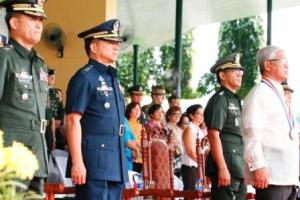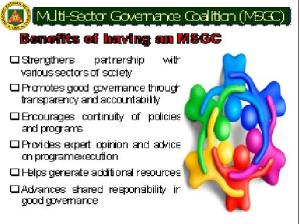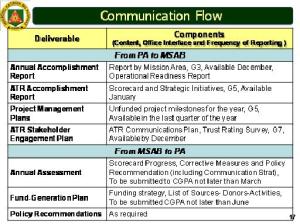Introduction
The Philippine Army (PA) is on a long-term journey towards transforming itself to be “a world-class army that is a source of national pride.” It firmly believes that to attain this goal, it is imperative that the Army reform and enhance its critical systems and processes in order to be a more credible, reliable, responsive and professional Army. In its determination to embrace a sustainable transformation that will permeate through every level of the organization, the PA, in partnership with the Institute for Solidarity in Asia (ISA), formulated the Army Transformation Roadmap (ATR). 
The ATR is an 18-year transformation and governance program largely based on the Performance Governance System (PGS), which is an adaptation of Harvard’s Balance Scorecard framework into the local circumstances of the Philippines. The PGS espouses a performance-based good governance culture and ensures the sustainment of strategies by establishing the participation of external stakeholders. More importantly, the PGS guarantees that external stakeholders are genuine partners in strategy formulation and execution. This will not only enhance transparency and accountability but will also ensure that strategies and programs are responsive to the needs of the public.
In recognition of the important role of external stakeholders in the PGS process and, hence, the ATR, the PA is moving towards establishing a multi-sector governance coalition, to be aptly named as the PA Multi-Sector Advisory Board (MSAB). The PA is currently undergoing the Compliance Stage, the second stage of the four-stage PGS Governance Pathway, and the establishment of the MSAB is one of the critical requirements to hurdle this stage.
In this light, this paper will present the proposed organizational concept of the MSAB. Firstly, it will highlight its importance vis-à-vis the implementation of the ATR. Secondly, it will discuss the organizational framework that will govern the MSAB. Finally, it will present the proposed composition of the MSAB and the value they will bring to the PA and the Board. Overall, this paper will argue that the organization of the MSAB is one important step in our journey towards good governance and performance excellence and attaining our goal of transforming the Army in an institution that can truly be a source of national pride for all Filipinos.
Importance of the Multi-Sector Advisory Board
One of the requirements to pass the PGS Compliance Stage is to achieve ‘alignment in expectations and support mechanisms’ in which the PA must work closely with its external and internal stakeholders and must get them to partner and support the organization in realizing the 2028 Vision. To attain this, therefore, the MSAB must be established and formalized. The MSAB will serve as the PA’s partner in generating the necessary support from its external stakeholders in relation to implementing the ATR and realizing the 2028 Vision.
The establishment of the MSAB highlights the PA’s commitment to genuine reforms. The MSAB will promote good governance through transparency and accountability. Also, it will encourage a stronger private-public partnership which is one of the key policy thrusts of President Benigno “Noynoy” Aquino III. Additionally, it will encourage the concept of shared responsibility in good governance. And it will encourage continuity of policies and programs, will provide expert opinion and advice on program execution, and will help generate additional resources which will contribute to the attainment of the goals of the ATR and the realization of the 2028 Vision to be ‘a world-class Army that is a source of national pride’.
Roles and Responsibilities
The MSAB will be organized as an advisory board, primarily to provide the Commanding General, Philippine Army (CGPA) expert advice and opinion on how to successfully attain the goals underscored in the ATR. In this regard, the MSAB exist for the following purpose, namely: (1) to promote the continuity and sustainability of the Army Transformation Roadmap; and (2) to encourage shared responsibility in the success of the Army Transformation Roadmap. 
Based on this two-fold purpose, the following responsibilities of the Board are outlined. With regard to its role of “promoting the continuity and sustainability of the ATR”, the responsibilities of the MSAB are as follows:
- To recommend relevant policies to the PA which are critical for the latter to achieve breakthrough results;
- To provide strategic assessment of the ATR programs as the needs arise;
- To act as external auditor of the Army’s performance relative to the scorecard;
- To assist in the generation of additional resources for the ATR in the form of donations, grants, and the like; and
- To ensure that the PA completes its PGS and that all the processes contained in it are properly installed.
In line with its role of ‘encouraging shared responsibility in the success of the ATR, their responsibilities are the following:
- To help generate public support for the ATR;
- To help enhance partnership with key sectors and stakeholders which are crucial to the ATR implementation; and
- To help validate the results of the stakeholder surveys that will be conducted, i.e. Net Trust Rating and Net Satisfaction Rating.
Organizational Framework
The PA Multi-Sector Advisory Board is a Board organized by the CGPA to ensure the sustained and successful implementation of the ATR. It will be supported and funded by the PA. The MSAB shall comprise a maximum of fifteen (15) representatives of the key stakeholders of the PA. Its members shall be invited and appointed by the CGPA for a two-year term that will be renewable. To ensure an overlap of tenure, half of the initial members will be appointed for one year.
The Board will have three (3) key officers, namely: Chairman, Vice Chairman, and Secretary. The Chairman will be appointed by the CGPA. On the other hand, the Vice-Chairman will be elected by the members of the Board while the designated Secretary of the Board is the Assistant Chief of Staff for Plans, G5, PA.
Standing Committees
Moreover, in light of its purpose, roles and responsibilities, it will have six standing committees with three of the committees focusing on the strategic themes of the ATR. The table below outlines the committees and their respective functions:
|
Committees |
General Functions |
| Good Governance |
|
| Organizational Excellence |
|
| Operational Excellence |
|
| Resource Generation |
|
| Public Relations |
|
| Membership & Policy |
|
Board Activities
In line with its responsibilities, the MSAB will have four (4) regular activities: one (1) activity per quarter. Two of the activities will be the regular board meetings that will be done every first and third quarters of the year. Another regular activity will be the mid-year meeting with the Army leadership and management team comprising the Chief of Staff, PA, the general and coordinating staff and other key staff of the CGPA. This will be done every second quarter of the year. The last activity for the year will be the year-end strategy review with the CGPA together with his key staff.
The other activities of the MSAB which will be done as required or on the need basis are as follows: committee meetings, consultations with respective sectors, and field visitations. The members may also be invited to important PA activities like the Change of Command Ceremony, the PA Foundation Day, and the annual PA Senior Leaders Conference.
Communication Flow
For the Board to function effectively and efficiently, the flow of communication between the PA and the MSAB must be clearly defined. Both are expected to report to each other. On the side of the PA, it is expected that the following documents are submitted to the MSAB in line with its advisory function:
- PA Annual Accomplishment Report, which details the accomplishment by mission area as well as the operational readiness condition report;
- ATR Accomplishment Report, which outlines accomplishment relative to the 13 strategic objectives based on the CGPA Performance Governance Scorecard;
- ATR Project Management Plans, which will highlight the unfunded requirements; and
- ATR Stakeholder Engagement Plan that will contain the updates on the ATR Communications Plan and the results of the stakeholder surveys; and
- Regular ATR updates and other related information needed by the Board in line with its advisory functions.
As far as the MSAB is concerned, it expected that based on the outlined reports and information the Board will provide the PA with assessment, advice and policy recommendations. Specifically, the following are the expected deliverables of the Board:
- Annual Assessment, which will include an audit of the PA’s ATR progress, corrective measures and policy recommendations; and
- Fund Generation Plan, which will include a fund generation strategy and a list of probable sources of funds and resources for the PA to pursue its ATR initiatives.
Proposed Composition
The MSAB shall comprise a maximum of fifteen (15) representatives of the various sectors of our society who are willing to partner and help the PA pursue its transformation initiatives. The following sectors are proposed to be represented in the MSAB because of the value and expertise the will be able to bring and contribute:
1. Business Sector
The PA needs to formalize linkages with the business sector. Representatives from the aforementioned may be tapped as sources of creative ideas in resource generation to ensure that programs and projects related to the ATR are successfully implemented. Moreover, they can also provide expertise relative leadership and management.
2. Media
With the media’s power to influence public perception and effectiveness in information dissemination, it is necessary for the MSAB to have media representatives. They could help the PA strengthen linkages with media organizations thereby enhancing the flow of communication. Most importantly, they could provide expertise on how the PA could effectively reach out and communicate with its other stakeholders.
3. Academe
Representatives from the academe would be able to provide the PA with their expertise in security sector reform, leadership, management, and governance. With their expertise, they would then be able to help steer the PA towards the attainment of its vision. Most importantly, they have a heavy influence on the next generation and will be able to help the Army on how to effectively reach out the next generation of leaders.
4. Congress
The PA needs support of our legislators to pursue a successful transformation program because to be implementable the proposed programs and projects that will bring about the desired changes should be properly funded. Moreover, there may be a need to come up with legislative proposals in order to institutionalize these changes. In this regard, the representation from Congress will enhance the composition of the Board.
5. Local Government Units (LGU) and National Government Agencies (NGA)
The LGUs and NGAs are critical actors in development and security. They also act as alternate conduits for political participation. Thus, the MSAB needs representative from both the LGU and the NGA so that they can provide expert opinion on how to enhance cooperation and coordination among government entities as well as optimize the impact of current government programs.
6. Youth
The youth, characterized with spirit and resilience, must be represented in the MSAB because they provide fresh ideas and vigor to the Board. Moreover, they could provide the perspectives on how the Army could satisfy the expectations of the next generation and how the PA can tap the youth to pursue the ATR goals.
7. Church/Religious Sector
Another important representative of the MSAB should come from the religious sector because they act as the conscience of the community and this perspective could be helpful to the MSAB. Said representative could work on helping the PA find venues of greater participation as well as aid the Army in implementing programs with great social impact.
8. Legal
Of course, in the course of the activities of the MSAB, legal expertise will be necessary. Thus, the MSAB should have a representative from the legal sector who can provide legal advice and expertise.
9. Non-Government Organizations (NGOs)
Representation from the NGOs is beneficial to the PA because it encourages the greater involvement and participation of the community and society to the programs of the PA. They could also help advance good governance practices as well as facilitate in helping the PA generate resources to support its programs.
10. International Partners
The PA has a lot of international partners and allies who are willing to support the PA’s transformation goals. Giving them representation in the MSAB will benefit the Army because they could help in the generation of additional resources needed to implement ATR-related projects. Moreover, since the vision of the Army is to adopt world-class standards, they could provide regional and global perspectives.
Conclusion
The implementation of the ATR is a great challenge to the PA. In order to realize its vision to be “a world-class Army that is a source of national pride” by 2028, the organization needs the support of both its internal and external stakeholders. However, leveraging stakeholder support has always been a problem for the PA due to the inadequacies of the organization to effectively engage and partner with the various sectors of the society as well as the apparent lack of commitment of key external stakeholders brought about by the military’s weak credibility in carrying out genuine reforms. Therefore, formally establishing the Multi-Sector Advisory Board could be one of the concrete steps that the PA can undertake to highlight our commitment to genuine transformation founded on good governance and performance excellence.
Through the MSAB, the PA promotes transparency and accountability by opening institution to the scrutinizing eyes of our key stakeholders. They can assess the PA programs relative to the desired end-state as well as their impact to the Army’s constituents. They can also help ensure the successful and sustained implementation of the ATR through their expert opinions and recommendations. Moreover, they can facilitate the generation of additional resources to support ATR program implementation. Furthermore, the MSAB promotes stronger a stronger private-public partnership and advances the concept of shred responsibility in good governance.

Sometime in 2004, I developed the Comprehensive Enhancement of Development-Support Competencies (CEDC) Plan for the Philippine Army. Unfortunately it fell on deaf ears due to miopic and traditionalist thinking staffs of the HPA. I’m glad that finally, the Army’s leadership has become more progressive and people like you are the key to the Army’s transformation. I appreciate your efforts. If by chance you get to read about that CEDC, I think you will be sort of surprise to know that the plan has the making of inter-sectoral participation to development and transformation of the PA organization. (CEDC was developed under PA Doctrine Center during the time of LTC ALEXANDER AMBAL)
Good Luck to your efforts! I will support your Program.
Thank you very much for your support Sir. Let us all work together for a better Philippine Army.